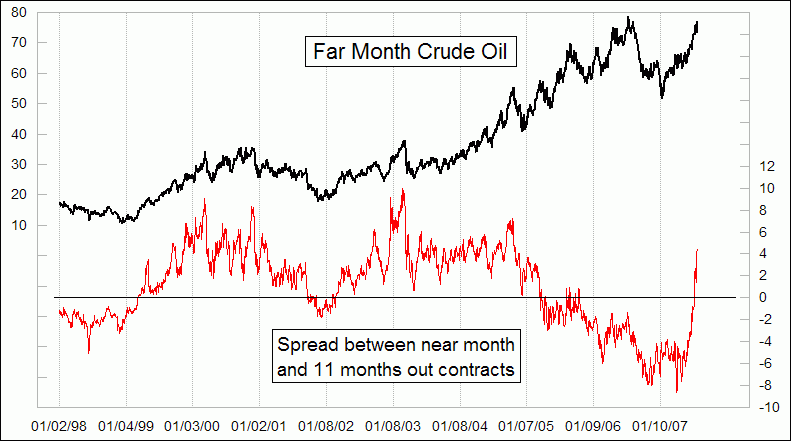Contango/Backwardation in Oil and Gold
I was re-reading your MMR #280 in which you showed the huge difference between near month crude oil price and the 12 months forward quotation. I wonder if a similar historical study for Gold futures was available: currently, the future contract expiring Feb. '08 is priced 35$ above the Feb. '07 quotation..
It is an interesting question you ask. I have not studied the differences in gold futures pricing quite as methodically as my studies of crude oil futures, but I have taken enough of a look to see that it is a wholly different situation.
The important difference between gold and oil has to do with the usage of each, and their storage costs. Every barrel of oil that is extracted is done so for the purpose of consumption. It only spends a small amount of time in "inventory". Gold, on the other hand, sees almost no consumption (a bit for electronics), and most of what gets produced goes into inventory and stays there, in the form of ingots, coins, or jewelry, all of which are convertible back into gold for use in some other fashion.
It costs a large amount of money to store oil, where as gold costs next to nothing to stash somewhere as a function of its value. This means that a trader can use gold futures to construct a synthetic T-Bill position. Let me explain.
On Friday, Jan. 5, the February gold contract closed at $606.90. The December contract closed at $635.80, a premium of $28.90, or 4.55%. If you annualized that 4.55% over the 10 months difference in expirations, you get 5.5%. That is a slight premium over the 5.117% yield on a 6-month T-Bill. So if you wanted to make more interest than is offered on T-Bills, you could buy spot gold now and sell a Dec. gold futures contract. You'd be protected from price change risk by holding the actual product you would be delivering in December, and you'd be pocketing the premium. But you'd have to have the financial wherewithal to pull this off, and you'd have to have a means of storing the gold while waiting for time to elapse. Then you would finally have to make "delivery" according to the terms of the futures contract. Those difficulties help to explain the slight premium over T-Bill yields. The premium has to be big enough to make it worthwhile, or the big arbitrage players would not bother.
But to do that with oil, you'd have to have a massive storage facility to hold the oil, and worry about fires, leakage, employees, security, etc. So your cost of storing oil on speculation or on arbitrage is just too huge to make it a profitable activity unless there were an absolutely huge positive premium between near and far month contracts. 
Back in April 2007, that spread got as wide as $8.63, based on the May 2007 vs. April 2008 contract prices. I'm not sure that even this much of a spread is wide enough to arbitrage by holding actual product. But it is a wide enough spread to say that the current near month price is well shy of where the producers and hedgers are saying oil prices should be 11 months from now, and that said that oil prices were likely to rally from there. They have indeed gone higher, and now (July 2007) we have a positive spread, whereby the near month contract costs much more than prices a year out. That condition says that the rally in crude oil prices is topping out.
I hope that helps.